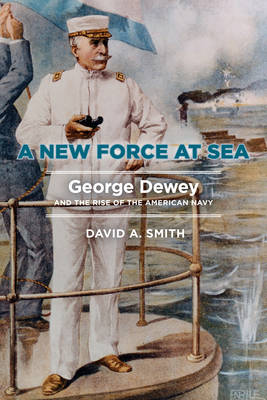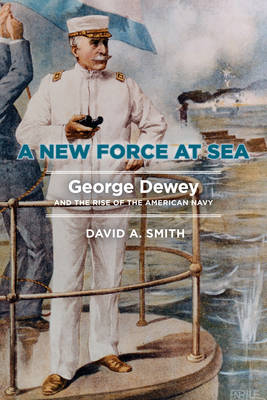
- Retrait gratuit dans votre magasin Club
- 7.000.000 titres dans notre catalogue
- Payer en toute sécurité
- Toujours un magasin près de chez vous
- Retrait gratuit dans votre magasin Club
- 7.000.0000 titres dans notre catalogue
- Payer en toute sécurité
- Toujours un magasin près de chez vous
A New Force at Sea
George Dewey and the Rise of the American Navy
David A Smith
Livre relié | Anglais
47,45 €
+ 94 points
Description
A New Force at Sea tells the story of one of the most important officers in the U.S. Navy between the Civil War and World War II. Born in Montpelier, Vermont, George Dewey attended the still relatively new U.S. Naval Academy, graduating in 1858. He served with distinction in the Civil War in the Union Navy, saw a significant amount of action in the Mississippi River and along the Atlantic coast, and was singled out for his leadership and bravery by his superior officers. In the wake of the war, Dewey remained in the Navy as an officer, but the American people were generally uninterested in any role their nation could play in the broader world and the Navy languished. Dewey however, refined his perception of what American global naval strategy could be. By the time the Spanish-American War broke out in 1898, Dewey commanded a squadron of ships on the far side of the Pacific. His victory in the Battle of Manila Bay instantly made him the most famous American military figure after Ulysses S. Grant. The degree to which Dewey bore responsibility for embroiling the United States in what came to be known as the Philippine Insurrection was overlooked by an American public that eagerly named children for him, composed songs in his honor, and competed to stage the most extravagant civic celebrations of the quiet naval officer from Vermont. It was a public role for which he was ill-suited. Such was Dewey's celebrity that he when he returned to the United States he was instantly spoken of as a serious candidate for the Presidency in 1900. After an abortive and half-hearted candidacy that damaged his public reputation, Congress raised his rank to the newly created "Admiral of the Navy," the rank he would hold for the rest of his life. He became the embodiment of Theodore Roosevelt's "big stick" attitude and the national symbol for American naval power. He served as the chairman of the new General Board of the United States Navy, created in 1900 as the first body to address questions of strategy and operational readiness. Dewey had a profound understanding that his career bridged two seminal periods in American naval history, and clearly understood the repercussions of his victory at Manila. He died in Washington in January 1917, shortly before the United States entered World War I fighting against Germany as he had foretold years earlier. He was buried at Arlington National Cemetery but shortly after reinterred at the Washington National Cathedral, the only U.S. military officer to have such an honor.
Spécifications
Parties prenantes
- Auteur(s) :
- Editeur:
Contenu
- Nombre de pages :
- 376
- Langue:
- Anglais
Caractéristiques
- EAN:
- 9781682475706
- Date de parution :
- 15-04-23
- Format:
- Livre relié
- Format numérique:
- Genaaid
- Dimensions :
- 158 mm x 232 mm
- Poids :
- 703 g

Les avis
Nous publions uniquement les avis qui respectent les conditions requises. Consultez nos conditions pour les avis.






